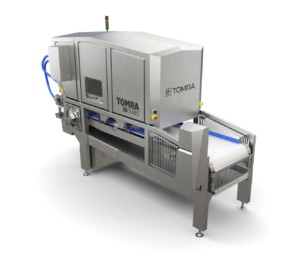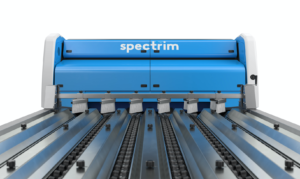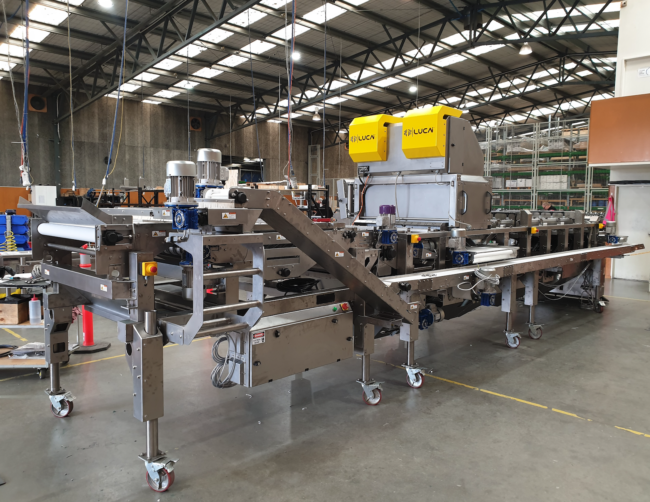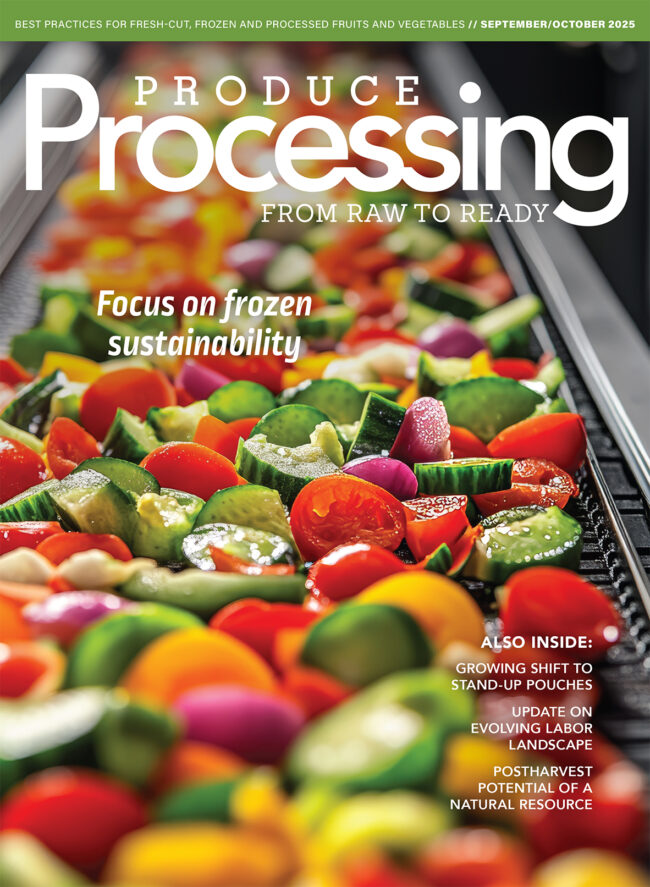TOMRA, Compac, BBC show off new equipment at Fruit Logistica
TOMRA Food, Compac and BBC Technologies exhibited at Fruit Logistica Berlin in early February.
Fruit Logistica is world’s leading fresh produce industry event, known for spotlighting new solutions and concepts, attracts close to 80,000 visitors from more than 120 countries.
TOMRA Food showed publicly for the first time the upgraded TOMRA 5B sorting machine. Suitable for potatoes, fruit and fresh-cut produce, the TOMRA 5B introduces new features which give unprecedented precision of control, enhancing yield and profitability.
Compac unveiled its next-generation sorting platform. Building on Compac’s market leading Multi Lane Sorter, the new platform introduces a range of unique features for enhanced hygiene and food trust, gentle handling, safety and performance. Compac also showed its recently introduced UltraView inspection module, which significantly improves detection of difficult defects located in the stem bowl and tip areas of the fruit UltraView takes the power of the Spectrim platform to the next level. It improves pack accuracy and takes another step in the direction of a fully automated pack line.
BBC Technologies introduced the new CURO8 fill-by-weight system, designed for cherries, blueberries and small tomatoes. BBC Technologies also exhibited its recently-introduced LUCAi artificial intelligence software for grading blueberries.
“The TOMRA 5B sorting machine, the next generation sorting platform, and CURO8 filling system will help food producers and packhouses enhance their efficiency and profitability at the same time as ensuring the highest standards of food quality and safety,” said Michel Picandet, head of TOMRA Food, “These are important new additions to TOMRA Food’s product line, which offers sorters and graders of many different types and sizes.”
TOMRA 5B sorter
TOMRA Food’s improved TOMRA 5B infeed belt sorting machine is designed to remove even the smallest foreign materials from lines of fruit or vegetables, ensuring food safety, and to allow the operator to easily adjust sorting criteria to the required food quality, eliminating the unnecessary disposal of useable produce. By introducing new features which give unprecedented precision of control, the TOMRA 5B enhances yield and profitability.

The TOMRA 5B offers the choice of four frame widths, from 800cm to 2000cm, and operates at belt speeds of two to five meters per second. As the produce moves along the belt, foreign material and produce imperfections are detected by anything from one to six on-belt cameras, a laser, and an off-belt camera. The cameras, which provide a 360-degree view with 0.27mm pixel resolution, are capable of detecting defects as small as 1mm. The off-belt laser, which operates with nine color and infrared ranges, detects up to 99% of foreign material. High-speed air jets remove from the line objects which need to be rejected or passed through a further sorting machine. To reduce false rejects, the pressure and position of the air jets adjusts automatically according to the type, size and weight of the produce.
New, easily programmable control features include Sort-to-Length, so that French fries can meet a pre-determined grade without unnecessary rejection of produce; Reverse Sorting, which recuperates 70-80% of good product which gets rejected when the infeed contains a defect level greater than 55%; and a SCADA system (Supervisory Control and Data Acquisition), which connects the sorter to a control center where fault-alerts show-up immediately and can be responded to remotely.
Other notable new features include Smart Sort, which helps operators easily define color specifications and detection settings; Color Cloud, which also enables operators to program precise color specifications to fine-tune the machine’s sorting abilities; a generic Shape Sort Toolbox, with a set of 30 detection tools which enable rejection of a broad set of defects; Datura Detection, which identifies and ejects 98% of the poisonous plant 2cm or more in diameter; Dynamic Cloud, which gives a real-time view of all the materials the machine is assessing as defects, so that detection settings can if necessary be adjusted; and Improved Smart Rejection, which makes it easy to sort batches of different qualities (for example, AAA grade and B grade French fries).
Compac’s next generation sorting platform
The new Compac sorter is based on the industry-leading MLS multi-lane sorter but incorporates technical developments to further enhance hygiene and food trust. The new platform also future-proofs packing houses in case of tightening food safety legislation and more demanding market expectations.

The new platform is capable of sorting a wide variety of soft fruit to an exceptionally high degree of accuracy. Designed from the ground up to meet the need of modern packing requirements, the new platform delivers industry-leading performance for weight, size, gentle handling and throughput.
Food trust is critical and Compac’s new platform has maximized the balance between gentle handling, throughput and hygiene. Wherever the fruit comes into contact with the sorter, the machine’s components are made of injection-molded plastics or food-grade stainless steel. These materials stand up to the harsh environments within a packing house, resistant to juice and other corrosive elements and allow the use of optimized chemicals for faster and more effective cleaning of components such as load-belts, cross belts, singulation sections, covers and spill chutes.
In another innovation, many of the food-contact components on the new design are engineered for quick-release. This enables faster and more effective deep-cleaning by allowing the tool-less removal of the machine’s lane dividers, double brush, chutes, brush drop, and cross-belt. Food-grade plastics resistant to cleaning chemicals are also used, for the machine’s chutes, ramps and sweeps.
Whereas a cross-belt would previously have taken hours to dismantle and clean, in a task requiring specialist staff and tools, now it can be cleaned thoroughly without specialist skills in as little as 15 minutes. And to avoid the interruption of stopping the line to disassemble the belts for cleaning, the new design features a cleaning mode which allows the line to continue running at a safe speed while staff clean the belts.
These improvements make it easy to ensure optimum standards of hygiene at the same time as increasing productivity and gentle handling. More than this, Compac’s new sorter is designed to give owners the perfect balance between food safety, operator safety, throughput, gentleness of produce-handling, and total cost of ownership.
Compac also exhibited its UltraView inspection module, which was launched in late 2019. UltraView maximizes the performance of Spectrim, the world’s most powerful fresh produce grading platform, by identifying defects which are otherwise difficult to detect located in the stem bowl and tip areas of the fruit. The UltraView module contains a dedicated set of high-resolution multi-spectral (color and infrared) cameras and LED lights which are located ideally close to the fruit, parallel to its direction of travel.
UltraView integrates with Spectrim to increase line efficiency and eliminate slow-downs that can occur when packing lots with a high incidence of defects. UltraView targets hard-to-detect defects and continues to reduce the need for manual grading on the line, and supports the adoption of pack automation solutions.
New CURO8 filling system
BBC Technologies’ new CURO8 filling system, which has eight filling stations, is an addition to the range which includes the CURO2, CURO12 and CURO16 models. The CURO8 was introduced in response to customer demand, for businesses which do not need the capacity of the CURO12 or CURO16 models. With eight filling stations, it offers packers an economical option with an even smaller footprint.
The CURO8 was designed for cherries, blueberries and small tomatoes and accommodates a range of final pack options. The low drops and minimal transitions ensure the fruit is handled gently. The CURO8 is capable of filling 125-gram packs of blueberries at a rate of up to 110 packs per minute.
The CURO8 has the same user interface as the other machines in the fill-by-weight range and integrates with Line Control to minimize personnel dependency. Following behind BBC Technologies’ MIRA360 or KATO260 graders, the CURO range increases productivity by improving efficiency and improves profitability by reducing overweight packs and minimizing fruit give-away. Multiple CUROs can be implemented in a single packing line, allowing growers to simultaneously pack for different markets.
BBC Technologies also chose Fruit Logistica to spotlight LUCAi artificial intelligence software. First made available in 2019 as an add-on for the KATO260 optical blueberry grader, LUCAi informs the machine how to classify each individual piece of fruit by processing up to 2,400 individual images of fruit every second. LUCAi is also able to view fruit in wavelengths not visible to the human eye, further enhancing its sorting accuracy. LUCAi is sensitive to subtle defects in the fruit, such as dehydration, bruising, and early anthracnose.











